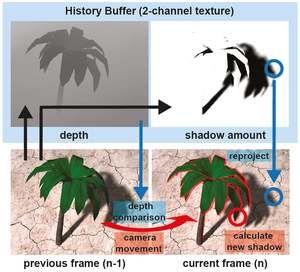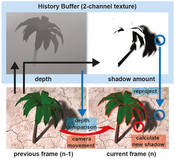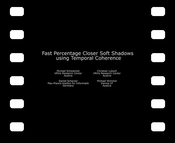Information
- Publication Type: Conference Paper
- Workgroup(s)/Project(s):
- Date: March 2013
- ISBN: 978-1-4503-1956-0
- Publisher: ACM
- Location: Orlando, Florida
- Lecturer: Michael Schwärzler
- Address: New York, NY, USA
- Booktitle: Proceedings of ACM Symposium on Interactive 3D Graphics and Games 2013
- Conference date: 21. March 2013 – 23. March 2013
- Pages: 79 – 86
- Keywords: real-time, temporal coherence, soft shadows
Abstract
We propose a novel way to efficiently calculate soft shadows in real-time applications by overcoming the high computational effort involved with the complex corresponding visibility estimation each frame: We exploit the temporal coherence prevalent in typical scene movement, making the estimation of a new shadow value only necessary whenever regions are newly disoccluded due to camera adjustment, or the shadow situation changes due to object movement. By extending the typical shadow mapping algorithm by an additional light-weight buffer for the tracking of dynamic scene objects, we can robustly and efficiently detect all screen space fragments that need to be updated, including not only the moving objects themselves, but also the soft shadows they cast.By applying this strategy to the popular Percentage Closer Soft Shadow algorithm (PCSS), we double rendering performance in scenes with both static and dynamic objects - as prevalent in various 3D game levels - while maintaining the visual quality of the original approach.
Additional Files and Images
Weblinks
No further information available.BibTeX
@inproceedings{SCHWAERZLER-2013-FPCSS,
title = "Fast Percentage Closer Soft Shadows using Temporal Coherence",
author = "Michael Schw\"{a}rzler and Christian Luksch and Daniel
Scherzer and Michael Wimmer",
year = "2013",
abstract = "We propose a novel way to efficiently calculate soft shadows
in real-time applications by overcoming the high
computational effort involved with the complex corresponding
visibility estimation each frame: We exploit the temporal
coherence prevalent in typical scene movement, making the
estimation of a new shadow value only necessary whenever
regions are newly disoccluded due to camera adjustment, or
the shadow situation changes due to object movement. By
extending the typical shadow mapping algorithm by an
additional light-weight buffer for the tracking of dynamic
scene objects, we can robustly and efficiently detect all
screen space fragments that need to be updated, including
not only the moving objects themselves, but also the soft
shadows they cast. By applying this strategy to the
popular Percentage Closer Soft Shadow algorithm (PCSS), we
double rendering performance in scenes with both static and
dynamic objects - as prevalent in various 3D game levels -
while maintaining the visual quality of the original
approach.",
month = mar,
isbn = "978-1-4503-1956-0",
publisher = "ACM",
location = "Orlando, Florida",
address = "New York, NY, USA",
booktitle = "Proceedings of ACM Symposium on Interactive 3D Graphics and
Games 2013",
pages = "79--86",
keywords = "real-time, temporal coherence, soft shadows",
URL = "https://www.cg.tuwien.ac.at/research/publications/2013/SCHWAERZLER-2013-FPCSS/",
}


 draft
draft

